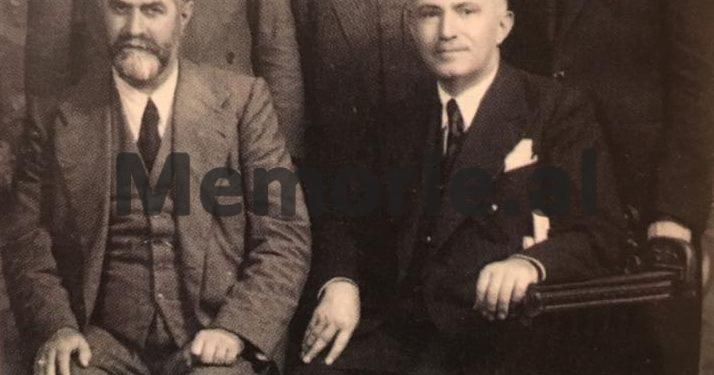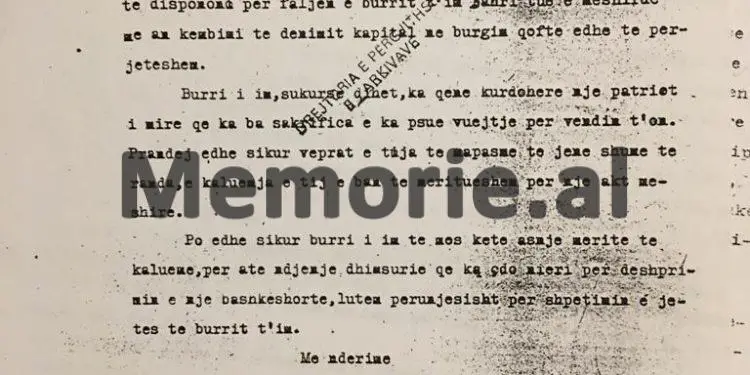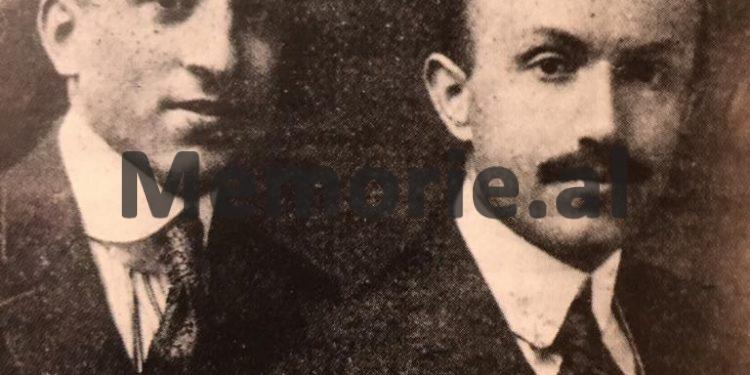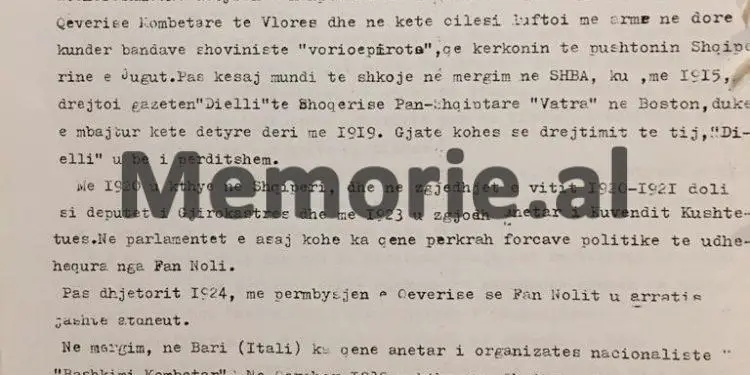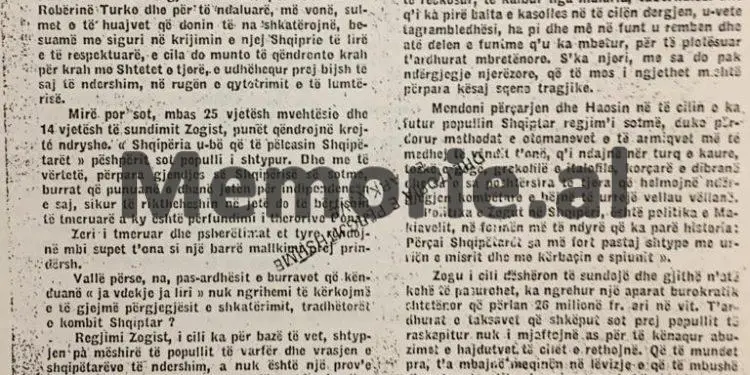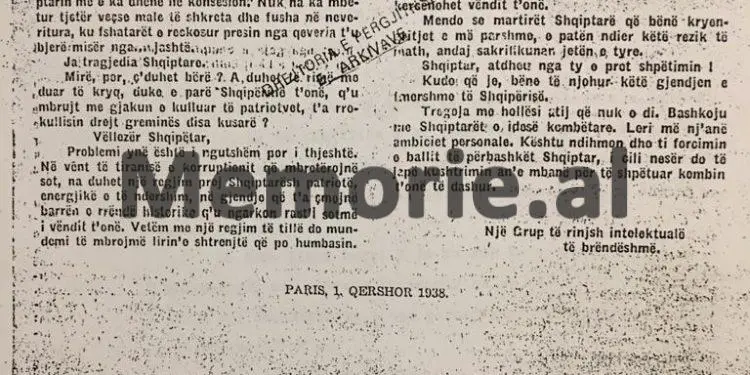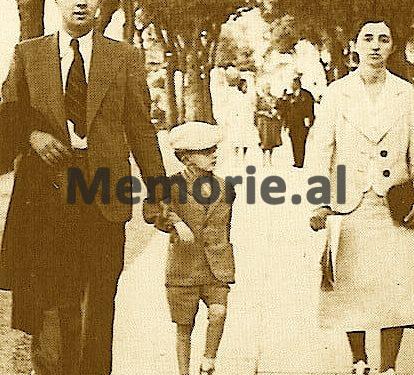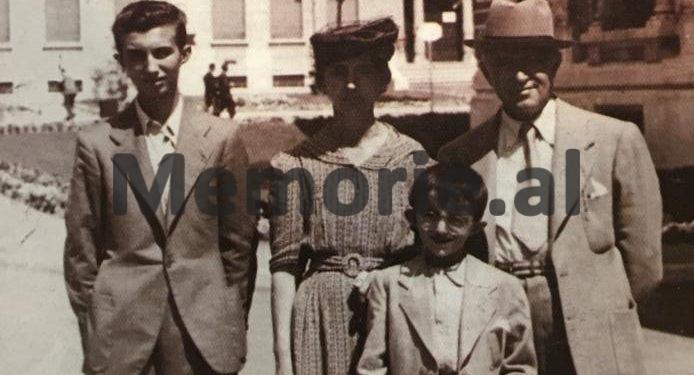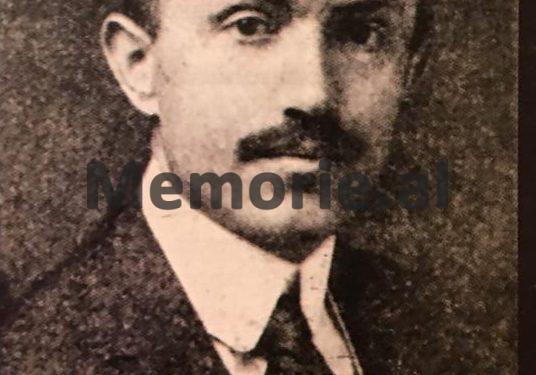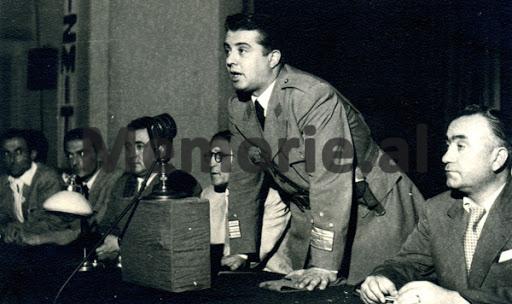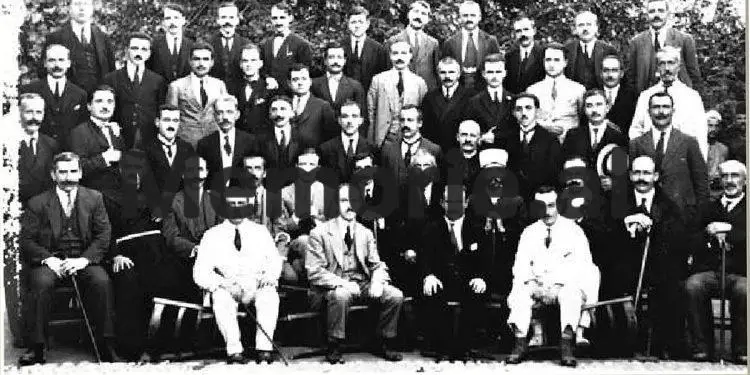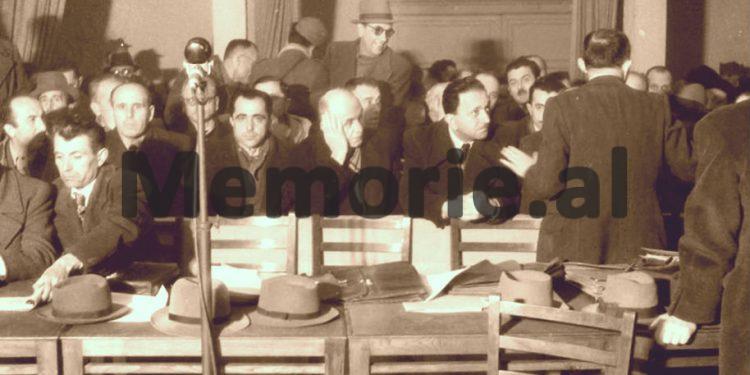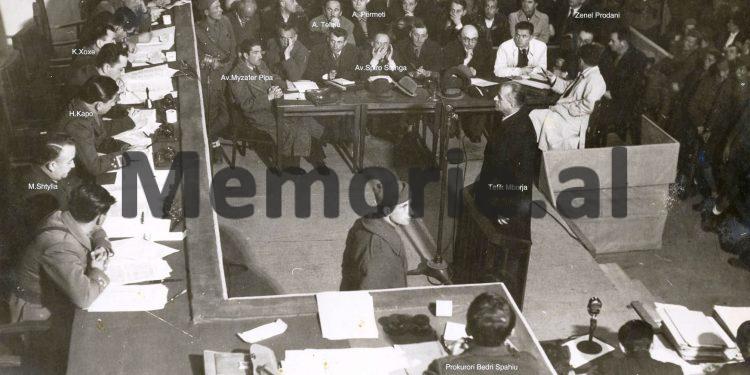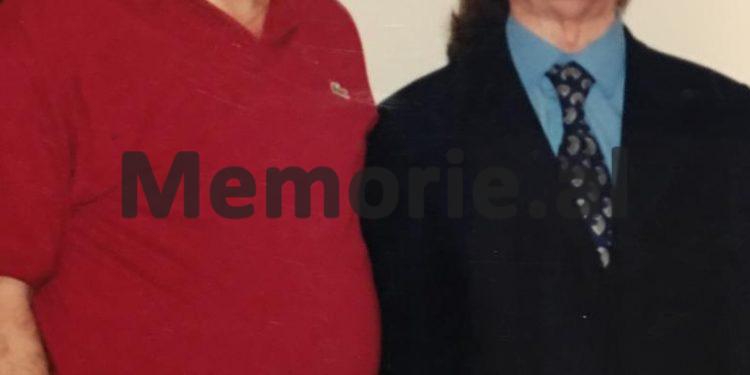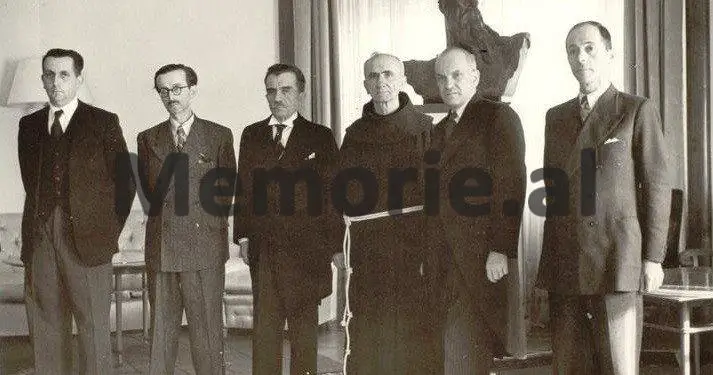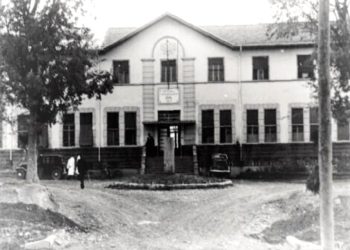Dashnor Kaloçi
Memorie.al publishes the unknown story of Bahri Omar, since his education in Istanbul, his work as deputy prefect of Himara, emigration to the USA where he directed the newspaper “Dielli” of the Patriotic Association “Vatra”, returning to Albania and being elected as a member of parliament first Albanian, fleeing Albania after the overthrow of Fan Noli’s government and long 15-year emigration to Bari, Italy as anti-Zogist, returning to Albania in 1939 where he participated in the founding of the nationalist organization, “Balli Kombëtar”, acceptance of the post of Minister of Foreign Affairs in the government of Rexhep Mitrovica in 1944, relations with his brother-in-law, Enver Hoxha, whom he received and sheltered in the house of Mullet where he was staying, not accepting the “offer” of his close friend, Qazim Mulleti, in September 1943, for him to leave Albania, the arrest by the partisans in November of that year, the visit of Nexhmie Hoxha to prison after his marriage to Enver, Fahrie’s conversations with his brother, Enverin and then with Koci Xoxen to spare Bahri’s life, the official prayer she made for it and the public testimony of Bedri Saphiu, the former Special Court prosecutor, what Enver had told him about Bahri’s shooting and the words of his last before the execution on the afternoon of April 14, 1944 at Priest Hill.
March 1945. Less than four months had passed when the partisan brigades of Enver Hoxha had entered as triumphant in Tirana and in all other cities of Albania, when in the Cinema “Kosova” of the capital, the Special Court would open, where it would to be tried and punished “enemies of the people.” What was this trial and who were the defendants who would be placed there in the dock?
Tirana was not yet well liberated, according to orders coming from the Headquarters of the First Corps of the National Liberation Army (with General Commander Enver Hoxha who was then in Berat), which was located somewhere at the foot of Dajti Mountain in the village of Priska, some partisan teams entered the neighborhoods of Tirana and according to the lists they had received from their commands, arrests began against those persons whose names were on those lists. Former prime ministers, ministers, deputies, prefects, mayors, military and other senior officials who had served from the government of Ismail Qemali, that of the King Monarch, Zog, to that under German occupation led by Ibrahim bey Bicaku, would be taken from the houses where they lived and with handcuffs in hand would be sent to the offices of the “People’s Defense Section”, after previously being told “will you come with us just for an explanation” ?!
After 43 days of uninterrupted court hearings with open doors there in Cinema “Kosova” where in addition to those who attended her hall, large crowds of people, family, relatives or just curious people who followed her in her outer courtyard with by the artisans who had been installed there the day before the start of that sensational process that was also reflected in the two main newspapers that were published at the time, “Bashkimi” and “Zeri i Popullit”, on April 13, the presiding judge, lieutenant general, Koci Xoxe, would announce the sentences. Of the 60 defendants tried there on charges of “war criminals,” 17 would be sentenced to death, shot, and executed just one day later northeast of the capital, in a place called, “Priest’s Hill”.
One of the things that most impressed and seemed at first quite unbelievable to all those who followed with great interest the development of the court hearings of that sensational process, was the fact that in that list of 17 people who would be shot, was also Bahri Omari, the husband of the “Commander”‘s sister, as the Colonel-General was called at the time, Enver Hoxha, who, dressed in military uniform and with a revolver on his belt, also chaired government meetings as its prime minister!
Who was Bahri Omari, where did he graduate, what was his past and what relations did he have with Enver from the time he became his brother-in-law until the day he was arrested as “enemy of the people in November 1944”?! Why did Enver Hoxha shoot his brother-in-law, Omar, and he did not respond to his sister, Fahrie, one day after the death sentence and the day before the shooting, when she asked her brother to spare her husband’s life her?! Regarding this and others, this article is based on the evidence given to us in 1998 by Professor Luan Omari, as well as a large number of archival documents, which he gave us several years ago. later, his late brother, Fatos, with whom we wanted to write a monograph on their father, Bahri Omar, which we could not do…?!
He graduated in Istanbul, deputy prefect in Himara, and Director of “Dielli” in Boston
Born on February 10, 1889, Bahri Omaroi would be sent to Istanbul where after graduating from the Rruzhdie school he would pursue higher university studies at the Mylkie Shahanes, graduating in 1910 with a degree in Administration. of that faculty, in the capital of the Ottoman Empire. After returning to his homeland, somewhere in the years 1911-1912, he would be appointed to serve as a clerk in the state administration of the province of Kurvelesh and after some time also in the position of deputy prefect of Himara. After several years of work in that official position, sometime around the beginning of 1914, when the Balkan War had begun, in the whirlpool of which Albania was also involved, exactly in the period when the Greek members entered the Albanian territory committing massacres. human against the defenseless civilian population, Bahriu fought with arms in their hands against them and very close to him was killed the companion that Bahriu had as deputy prefect. After that, in order not to fall into the hands of the Greek authorities, Bahri emigrated to the United States of America, as he had a regular American passport. Bahriu joined the patriotic circles of Albanians that were organized in the Pan-Albanian Society “Vatra”, where its leaders would become the refuge of many Albanians who for many reasons were forced to leave their homeland. entrusted him with the task of director of her newspaper, “Dielli”, based in Boston, running that body that became the refuge of many patriotic Albanian intellectuals, until 1919.
Member of the First Parliament and Assemblyman
At the end of the First World War, or as it was called at that time “The Great War”, Bahriu would return to his homeland, re-entering the political and administrative life of the country and in the spring of 1921, after leading for some time the progressive newspaper “Shekulli”, being one of its main editorialists, he ran as a deputy of Gjirokastra and won the first parliamentary elections that took place on April 21 of that year. Likewise, two or three years later, in 1923, he was elected a member of the Constituent Assembly (Parliamentary Assembly) and in that parliament he sided with the group led by Fan Noli. Due to this reason, at the end of 1924-, with the return of Zog to power, Bahri Omari with some of his friends, former MPs, such as: Sejfi Vllamasi, Kol Tromara, Sheh Karbunara, etc., left Albania. and settled as a political emigrant in Bari, Italy, where was the epicenter of anti-Zogist emigration throughout the Apennine Peninsula. In that city where Bahri was one of the main exponents of anti-Zogism, he would stay for a full 15 years, throughout the period of the Zog Monarchy and he was one of the main people of the nationalist organization “National Union” formed by anti-Zogist immigrants. On the eve of the invasion of Albania in April 1939, Bahriu was one of those emigrants who responded positively to the letter that King Zog sent to all patriots and Albanian political emigration outside Albania, in Europe and America., to return home and face the danger that was threatening him.
Return to Albania in the ’30s and founder of “Balli Kombëtar”
After returning to Albania in 1939, Bahriu would join some of his former friends, such as Mit’hat Frashëri, Hasan Dosti, Kol Tromara, Ali Këlcyra, Faik Quku, etc., who would form the organization. nationalist “Balli Kombëtar”. That nationalist organization would be created just a few days after the occupation of Albania by fascist Italy and would function as a secret committee. On December 5, 1939, Bahriu was appointed a Member of the Supreme State Council, a position he held until the day he was appointed Minister of Foreign Affairs in the government headed by Rexhep Mitrovica in 1944. As an educated and erudite intellectual with a broad culture, an excellent connoisseur of several foreign languages (English, French, Italian and Turkish), Bahriu looked further to the current political interests and his knowledge he had put at the service. of the Albanian national cause since he was in Boston as the editorial director of the newspaper “Dielli”. From this context, throughout the period of occupation of the country (1939-1944), Bahriu stood out as one of the most prominent intellectuals and politicians of that time and as one of the main leaders of the nationalist organization “Balli Kombëtar”, Bahriu influenced that he political formation to be led by the ideas of the French ideologue, Eduard Herjo, who was the greatest ideologue of the Radical-Socialist Party, the largest center-right party of that time in Europe. Since 1939, after returning from Italy, Bahriu did not go to his hometown in Gjirokastra, but settled in Tirana with his family, his wife Fahrie Hoxha Omari (with whom they had been married since 1923). and two sons, Luan and Fatos. Fahrie Hoxha was the sister of Enver Hoxha, with whom Bahri had a very normal relationship and had helped her with money during the period he was studying in France in the early 1930s, and had met her several times. at his home in Bari, Italy, where Enver often went.
Omar’s house at Mulletët, base of Enver and the ballists
The friendship with his brother-in-law, Enver Hoxha, who from November 1941 had become the leader of the Communist Party of Albania, Bahriu continued quite normally throughout the period of occupation until 1943 and Enver went normally to his sister and brother-in-law who lived in a rented house (very close to the New Bazaar), which Bahri had taken from his friend, Qazim Mulleti, who at that time was the function of the Prefect of Tirana. In that house came all the leaders of the “National Front” such as Mit’hat Frashëri, Hasan Dosti, Kol Tromara, etc. who were also close friends of Bahri, as well as Enver Hoxha who was both at home there and on the ground floor, he hosted some of the main leaders of the War and the Communist Party, such as Dr. Ymer Dishnica, Nako Spiron, Ramize Gjebrena, Masar Shehu, etc., who were often sheltered in that base where they were welcomed as friends by the owner of the house. This thing, that is, the attendance that Enver would do to the house of his sister and brother-in-law, as illegal, would continue until the beginning of the spring of 1943, when the relations and relations between the main leaders of the National Front and those of The Albanian Communist Party would be very hardened and at that time Enver would finally leave without stepping on it anymore. Together with Enver, some of Bahri’s friends would leave that house, such as Dr. Ymer Dishnica, Nako Spiro, etc., close associates of Enver Hoxha who were also in leading positions in the Communist Party and the “Democratic Front” headed by it. Apparently, their paths here would be separated once and for all, as they had taken other “directions”, never to meet each other again! Thus, in July 1943, after a signal received by Bahri from some of his friends (said by Qazim Mulleti), that he was on a list of names that S.I.M.I. (Italian Military Intelligence Service) that he would be arrested by them, Bahriu secretly leaves Tirana and at the suggestion of Mit’hat Frashëri, he goes to the city of Gjirokastra where he becomes active with the nationalist organization “Balli Kombëtar” and together with Ali Këlcyra and Faik Qukun, are directed towards that organization by reconciling its work and activity throughout the South of Albania. In September of that year, after the capitulation of the Italian army and the entry of partisan forces in the city of Gjirokastra, which made several reprisals in the homes and families of the nationalist elements of the National Front, executing some of them, Bahriu was able to hide after foresaw the danger that was threatening him. After the partisans left the city of Gjirokastra where the German forces entered, Bahriu was able to secretly leave from there and go to the Delvina area, from where he then returned to Tirana via the Coast Road. On the way, near Vuno, he falls into a partisan ambush that was organized with an order to kill him, from which he managed to escape by not being slightly injured in the leg. In Tirana, Bahriu moved back to the Mullet house where his family, his wife, Fahria and his two sons, Luan and Fatos, continued to rent.
Bahriu accepts the post of Foreign Minister
On February 8, 1944, at the request of the head of the “National Front”, Mit’hat Frashëri, Bahri Omari agreed to participate in the government headed by the Prime Minister, Rexhep Mitrovica, taking the post of Minister of Foreign Affairs in that cabinet. In that position, Omar stayed for three or four months and during all that time he did not sever ties with some of the main leaders of the “Democratic Front” led by his brother-in-law, such as Shefqet Beja, Muharrem Vllamasi, who came to nothing. bad and without any fear, in his house, even though it was opposite that of the Prefect of Tirana, Qazim Mulleti. Three months after leaving the Mitrovica government to resign, in September 1944, his close friend Qazim Mulleti, who had also resigned as Prefect of Tirana, proposed that the two leave together. Tirana and Albania as well, as it was being seen, the triumph of Enver Hoxha’s partisan forces was a matter of days. Bahriu rejected his friend’s offer, for several reasons, where, after what he was already tired of after 15 years of emigration, and the other, perhaps the most important, was what the partisans who would come to power, would to be headed by his brother-in-law, Enver Hoxha, who had already consolidated at the head of the Communist Party and the National Liberation Army as well. And he did not have to feel threatened by them, as he felt completely clean and throughout his life, since the time of the Declaration of Independence in 1912, in emigration to the US, running the “Sun” , in his 15-year emigration as an anti-Zogist, at the head of the nationalist organization “Balli Kombëtar” and those three or four months as a member of the Mitrovica government cabinet, he had worked only for the good of Albania. Regarding the proposal to leave Albania in November 1944, Luan Omar’s family has another version, proving that it was his friend, Vehip Runa and not Qazim Mulleti who suggested him to flee. In this regard, according to Mrs. Donika Omari, Bahriu told Fahrie that he encouraged them to leave: “I have been an honest democrat all my life. Find me whatever finds me. “I was left with my belongings all my life.” But the prediction made by Bahri was not said to come out as he thought, because from the beginning of November of that year, when the German forces had not yet left Tirana and the partisans controlled only the outskirts of Tirana and their headquarters. who was assigned to lead the fight for the liberation of the capital was stationed in the village of Priska, a squad of partisans knocked in the late hours on the main gate of the house where Bahriu lived, repeating the well-known “refrain” “you will come with us to command, as for a clarification”. Which they had repeated all those days, wherever they went according to the list that had come to them from their command.
Enver: Even Bahri like the others…!
For several months, until March 1945, Bahriu was kept isolated in the Old Prison of Tirana (at “Mine Peza”) where many of his friends were arrested, such as: former prime ministers, ministers, deputies, mayors, mayors, military and other senior officials who had served from the government of Ismail Qemali, of the King’s Monarchy, Zog, to that under German occupation led by Ibrahim bey Bicaku. During his time in that prison, he was visited from time to time by his family, his wife, Fahria, and his son, Fatos (Luani was in the partisan ranks at the time), and on one of the first days of January In 1945, together with Fahrie, he went to meet his brother-in-law (Enver)’s bride, Nexhmie Junglini, who, according to Gjirokastra custom, was sending her husband’s weddings wedding plums to rent. According to the public testimony given to us by Xhemal Alimehmeti (former exponent of the Youth of Balli Kombëtar) who was then in a cell with Omar and other close friends of his, Bahriu did not want to take the plums he offered him. Nexhmia at the meeting room counter, but after insisting on his close friend, Kol Tromara (whom Bahri never broke), he accepted them. But Luan Omar’s family denies that Nexhmie Hoxha went to prison to meet Bahri and give her (Nexhmia) family’s wedding gifts. According to Mrs. Donika Omari, it was Fahria who went to prison with the wedding gifts of Nexhmia’s family and Bahriu initially did not want to accept them, but his close friend, Kol Tromora, intervened and told him: “Dale “Bahri, we are not idle.” Special Court chaired by the President, Lieutenant General, Koci Xoxe, with members: Halim Budo, Gaqo Floqi, Dr. Medar Shtylla, Faik Shehu, Beqir Balluku, Bilbil Klosi and Gjon Banushi, and the prosecutor, Bedri Spahiu, which began in March and lasted about 43 days with uninterrupted hearings, on April 12, 1945, gave the decision, which read the chairman, lieutenant generation, Koci Xoxe. Of the 60 defendants who were in the dock, 17 were sentenced to death by firing squad (while others to heavy imprisonment) and one of them was Bahri Omari.
Fahrija, official prayer to forgive Bahri’s life
The death sentence of Bahri Omar caused a great commotion at that time and even more so it was unexpected and from Enver’s sister, who immediately after the decision went to meet her brother, (in his villa) asking him to forgive her Bahri’s life and he should be sentenced to at least 25 years in prison, or even life imprisonment. In the few minutes that Enver waited for his sister on foot, he told her that he had nothing in hand, as he had been tried by the “People’s Court” which had given deserved sentences for “enemies of the people”. While Fahria was not believing his ears with the words he heard from his brother’s mouth which fell like a bomb, with tears in his eyes, he asked his brother where he could “crash” for that…?! And more to remove it, Enver told her that she could make a prayer and officially send it by mail to the General Anti-Fascist National Liberation Council, as was the law, and wait for a response from the competent bodies. With some hope, Fahria separated from her brother and immediately went to her house, writing the prayer which said:
V.F. L.P.
Tirana on April 13, 1945
Presidency of the General Antifascist Council N. Ç.L
Tirana
Signed Fahrie Omari, the wife of the convict, Bahri Omari, I have the honor to ask you with the broken heart of a woman to pardon my husband Bahri, to have mercy on him by exchanging the capital punishment in prison, even eternal.
My husband, as you know, has always been a good patriot who has made sacrifices and suffered for our country.
Therefore, even if his maiden deeds are very serious, his passing makes him deserving of an act of mercy.
Even if my husband has no past merit, for those feelings of compassion that every man has for the desperation of a wife, I humbly pray for the salvation of my husband’s life.
Regards
Fahrie Omari
Koci Xoxe: Fahrie, for me, Bahri should not have been arrested at all…!
As Fahria wrote the letter and immediately sent it to the post office, it was not enough. After that, she immediately went to Koci Xoxa’s house, which was next to Enver, and begged Koci to look at the possibility of forgiving Bahri’s life. Koci, after listening to him until the end, said: “Fahrie, who sent you here to me”?! And Fahria told her that he had been sent by Enver, telling him: ‘he had nothing to do with Bahri, so she could talk to Koci or Bedri better’. Koci, very surprised by what Fahria was saying to her, without finishing her speech well, interrupted him, saying: “Fahrie, if it was for me and Bedri, Bahri should not have been arrested at all and not shot anymore, but we have carried out the orders of the Party… and you are tired in vain that you have come to me”. This, Fahrie’s meeting with Koci Xoxa and the whole conversation between them, was publicly confirmed to us in the early 1990s, (the author of this article) by Koci Xoxa’s wife, Sofia, in the presence of her, Genc and Fatos at their house near Kavaja Street). Regarding Fahrie Omar’s attempts to save the life of her husband, Bahri, Luan Omar’s family does not confirm the version that Fahria went to her brother, Enver to ask him to save her from the bullet, but according to testimony of Mrs. Donika Omari, Fahria only went to Bedri Spahiu for that. According to the Omari family, Fahrien was encouraged by lawyer Suat Asllani to send a letter to the Anglo-American mission, and she sent that letter, but it is not known if she received a response from them.
Testimony of Bedri Spahiu: Enver told me that if I did not kill him, I could not kill the others…?!
Regarding the shooting of Bahri Omar, in the early ’90s, the former Special Court prosecutor, Bedri Spahiu, who from 1955, when he was beaten by Enver Hoxha spent his life in political prisons and in exile until 1991. Regarding the sentencing and shooting of Bahri Omar, he wrote, among other things: “I know from many people that as a prosecutor of that trial I have been accused of having Bahri Omar was also shot, but the truth remains the same. I admit that if Bahri Omari had been resurrected a thousand more times, if I had been a prosecutor, I would have shot him a thousand times with the greatest pleasure even without Enver Hoxha’s order, but for the sake of truth I told Enver that Bahri was not could shoot him, as he was his sister’s husband and that he had sheltered him in his house while Enver was in Tirana. “Bedri ‘, Enver told me: if I did not shoot Bahr I will not kill the others”!
Bahri’s words before the shooting…
On April 14, 1945, just one day after the letter that Fahrie Omari had sent to the General Antifascist National Liberation Council and the conversation he had with Koci Xoxen, a military vehicle surrounded by many partisan guards, in the afternoon received the road to the north-eastern side of the capital, somewhere in a place called Priest Hill, which was destined for the execution of 17 death row inmates by the Special Court. According to the law, the prosecutor had to be present at those moments, who had to follow the implementation of the court decision until the end. After the 17 convicts were asked to have the last word and the commander of the firing squad was asked to turn their backs as he would give the command, fire, only one of them refused to return. It was Bahri Omar who was told: “Do not turn your backs on the barrels of weapons, that is how only the enemies are killed, we are not enemies and this will be proven by history”! “These were the last words that Bahri Omari said before his death”, which were written in his memoirs by the former prosecutor Bedri Spahiu, who took part in the execution of those 17 death row inmates that afternoon of April 14, 1945… /Memorie.al




